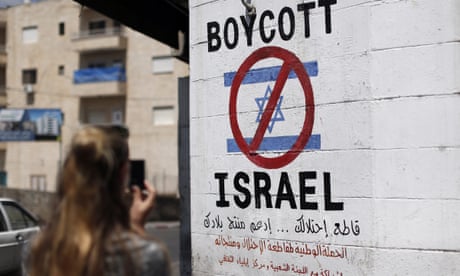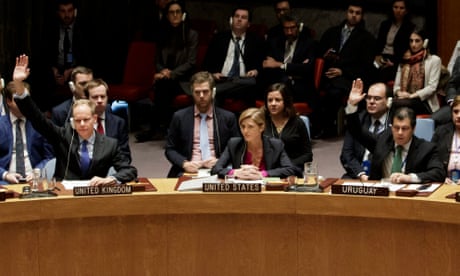It is a bewildering and alarming time to be a Jew, both because antisemitism is rising and because so many politicians are responding to it not by protecting Jews but by victimising Palestinians.
On 16 February, members of France’s yellow vest protest movement hurled antisemitic insults at the distinguished French Jewish philosopher Alain Finkielkraut. On 19 February, swastikas were found on 80 gravestones in Alsace. Two days later, the French president, Emmanuel Macron, after announcing that Europe was “facing a resurgence of antisemitism unseen since World War II”, unveiled new measures to fight it.
Among them was a new official definition of antisemitism. That definition, produced by the International Holocaust Remembrance Alliance in 2016, includes among its “contemporary examples” of antisemitism “denying the Jewish people their right to self-determination”. In other words, anti-Zionism is Jew hatred. In so doing, Macron joined Germany, Britain, the United States and roughly 30 other governments. And like them, he made a tragic mistake.
Anti-Zionism is not inherently antisemitic – and claiming it is uses Jewish suffering to erase the Palestinian experience. Yes, antisemitism is growing. Yes, world leaders must fight it fiercely. But in the words of a great Zionist thinker, “This is not the way”.
The argument that anti-Zionism is inherently antisemitic rests on three pillars. The first is that opposing Zionism is antisemitic because it denies to Jews what every other people enjoys: a state of its own. “The idea that all other peoples can seek and defend their right to self-determination but Jews cannot,” declared US Senate minority leader Chuck Schumer in 2017, “is antisemitism.”
As David Harris, head of the American Jewish Committee, put it last year: “To deny the Jewish people, of all the peoples on earth, the right to self-determination surely is discriminatory.”
All the peoples on earth? The Kurds don’t have their own state. Neither do the Basques, Catalans, Scots, Kashmiris, Tibetans, Abkhazians, Ossetians, Lombards, Igbo, Oromo, Uyghurs, Tamils and Québécois, nor dozens of other peoples who have created nationalist movements to seek self-determination but failed to achieve it.
Yet barely anyone suggests that opposing a Kurdish or Catalan state makes you an anti-Kurdish or anti-Catalan bigot. It is widely recognised that states based on ethnic nationalism – states created to represent and protect one particular ethnic group – are not the only legitimate way to ensure public order and individual freedom. Sometimes it is better to foster civic nationalism, a nationalism built around borders rather than heritage: to make Spanish identity more inclusive of Catalans or Iraqi identity more inclusive of Kurds, rather than carving those multiethnic states up.
You’d think Jewish leaders would understand this. You’d think they would understand it because many of the same Jewish leaders who call national self-determination a universal right are quite comfortable denying it to Palestinians.
Argument number two is a variation on this theme. Maybe it is not bigoted to oppose a people’s quest for statehood. But it is bigoted to take away that statehood once achieved. “It is one thing to argue, in the moot court of historical what-ifs, that Israel should not have come into being,” argued New York Times columnist Bret Stephens earlier this month. However, “Israel is now the home of nearly 9 million citizens, with an identity that is as distinctively and proudly Israeli as the Dutch are Dutch or the Danes Danish. Anti-Zionism proposes nothing less than the elimination of that identity and the political dispossession of those who cherish it.”
But it is not bigoted to try to turn a state based on ethnic nationalism into one based on civic nationalism, in which no ethnic group enjoys special privileges.

In the 19th century, Afrikaners created several countries designed to fulfil their quest for national self-determination, among them the Transvaal and the Orange Free State. Then, in 1909, those two Afrikaner states merged with two states dominated by English-speaking white people to become the Union of South Africa (later the Republic of South Africa), which offered a kind of national self-determination to white South Africans.
The problem, of course, was that the versions of self-determination upheld by the Transvaal, the Orange Free State and apartheid South Africa excluded millions of black people living within their borders.
This changed in 1994. By ending apartheid, South Africa replaced an Afrikaner ethnic nationalism and a white racial nationalism with a civic nationalism that encompassed people of all ethnicities and races. It inaugurated a constitution that guaranteed “the right of the South African people as a whole to self-determination”.
That wasn’t bigotry, but its opposite.
I don’t consider Israel an apartheid state. But its ethnic nationalism excludes many of the people under its control. Stephens notes that Israel contains almost 9 million citizens. What he doesn’t mention is that Israel also contains close to 5 million non-citizens: Palestinians who live under Israeli control in the West Bank and Gaza (yes, Israel still controls Gaza) without basic rights in the state that dominates their lives.
One reason Israel doesn’t give these Palestinians citizenship is because, as a Jewish state designed to protect and represent Jews, it wants to retain a Jewish majority, and giving 5 million Palestinians the vote would imperil that.
Even among Israel’s 9 million citizens, roughly 2 million – the so-called “Arab Israelis” – are Palestinian. Stephens says overturning Zionism would mean the “political dispossession” of Israelis. But, according to polls, most of Israel’s Palestinian citizens see it the opposite way. For them, Zionism represents a form of political dispossession. Because they live in a state that privileges Jews, they must endure an immigration policy that allows any Jew in the world to gain instant Israeli citizenship yet makes Palestinian immigration to Israel virtually impossible.
They live in a state whose national anthem speaks of the “Jewish soul”, whose flag features a Star of David and which, by tradition, excludes Israel’s Palestinian parties from its governing coalitions. A commission created in 2003 by the Israeli government itself described Israel’s “handling of the Arab sector” as “discriminatory”.
So long as Israel remains a Jewish state, no Palestinian citizen can credibly tell her son or daughter that they can become prime minister of the country in which they live. In these ways, Israel’s form of ethnic nationalism – Zionism – denies equality to the non-Jews who live under Israeli control.
My preferred solution would be for the West Bank and Gaza to become a Palestinian state, thus giving Palestinians in those territories citizenship in an ethnically nationalist (though hopefully democratic) country of their own.
I’d also try to make Israel’s ethnic nationalism more inclusive by, among other things, adding a stanza to Israel’s national anthem that acknowledges the aspirations of its Palestinian citizens.
But, in a post-Holocaust world where antisemitism remains frighteningly prevalent, I want Israel to remain a state with a special obligation to protect Jews.
To seek to replace Israel’s ethnic nationalism with civic nationalism, however, is not inherently bigoted. Last year, three Palestinian members of the Knesset introduced a bill to turn Israel from a Jewish state into a “state for all its citizens”. As one of those Knesset members, Jamal Zahalka, explained, “We do not deny Israel or its right to exist as a home for Jews. We are simply saying that we want to base the existence of the state not on the preference of Jews, but on the basics of equality … The state should exist in the framework of equality, and not in the framework of preference and superiority.”
One might object that it is hypocritical for Palestinians to try to repeal Jewish statehood inside Israel’s original boundaries while promoting Palestinian statehood in the West Bank and Gaza. One might also ask whether Zahalka’s vision of Jewish and Palestinian equality in a post-Zionist state is naive given that powerful Palestinian movements such as Hamas want not equality but Islamic domination.
These are reasonable criticisms. But are Zahalka and his colleagues – who face structural discrimination in a Jewish state – antisemites because they want to replace Zionism with a civic nationalism that promises equality to people of all ethnic and religious groups?
Of course not.
There is, finally, a third argument for why anti-Zionism equals antisemitism. It is that, as a practical matter, the two animosities simply go together.
“Of course it’s theoretically possible to distinguish anti-Zionism from antisemitism, just as it’s theoretically possible to distinguish segregationism from racism,” writes Stephens. Just as virtually all segregationists are also racists, he suggests, virtually all anti-Zionists are also antisemites. You rarely find one without the other.
But that claim is empirically false. In the real world, anti-Zionism and antisemitism don’t always go together. It is easy to find antisemitism among people who, far from opposing Zionism, enthusiastically embrace it.
Before Israel’s creation, some of the world leaders who most ardently promoted Jewish statehood did so because they did not want Jews in their own countries. Before declaring, as foreign secretary in 1917, that Britain “view[s] with favour the establishment in Palestine of a national home for the Jewish people”, Arthur Balfour supported the 1905 Aliens Act, which restricted Jewish immigration to the United Kingdom.
And two years after his famous declaration, Balfour said Zionism would “mitigate the age-long miseries created for western civilisation by the presence in its midst of a Body [the Jews] which it too long regarded as alien and even hostile, but which it was equally unable to expel or to absorb”.
In the 1930s, the Polish government adopted a similar tack. Its ruling party, which excluded Jews, trained Zionist fighters on Polish military bases. Why? Because it wanted Polish Jews to emigrate. And a Jewish state would give them somewhere to go. You find echoes of this antisemitic Zionism among some rightwing American Christians who are far friendlier to the Jews of Israel than the Jews of the US. In 1980, Jerry Falwell, a close ally of Israel’s then prime minister, Menachem Begin, quipped that Jews “can make more money accidentally than you can on purpose”.
Israel’s current prime minister, Benjamin Netanyahu, in 2005 said, “we have no greater friend in the whole world than Pat Robertson” – the same Pat Robertson who later called former US air force judge Mikey Weinstein a “little Jewish radical” for promoting religious freedom in the American military.
After being criticised by the Anti-Defamation League (ADL) in 2010 for calling George Soros a “puppet master” who “wants to bring America to her knees” and “reap obscene profits off us”, Glenn Beck travelled to Jerusalem to hold a pro-Israel rally.
More recently, Donald Trump – who told the Republican Jewish Coalition in 2015: “You’re not going to support me because I don’t want your money” – invited Dallas pastor Robert Jeffress, who has said Jews are going to hell for not accepting Jesus, to lead a prayer at the ceremony inaugurating the American embassy in Jerusalem.
In 2017, Richard Spencer, who leads crowds in Nazi salutes, called himself a “white Zionist” who sees Israel as a model for the white homeland he wants in the US.
Some of the European leaders who traffic most blatantly in antisemitism – Hungary’s Viktor Orbán, Heinz-Christian Strache of Austria’s far-right Freedom party and Beatrix von Storch of the Alternative for Germany, which promotes nostalgia for the Third Reich – publicly champion Zionism too.
If antisemitism exists without anti-Zionism, anti-Zionism also clearly exists without antisemitism.Consider the Satmar, the largest Hasidic sect in the world. In 2017, 20,000 Satmar men – a larger crowd than attended that year’s American Israel Public Affairs Committee policy conference – filled the Barclays Center in Brooklyn for a rally aimed at showing, in the words of one organiser: “We feel very strongly that there should not be and could not be a State of Israel before the Messiah comes.”
Last year, Satmar Rebbe Aaron Teitelbaum told thousands of followers: “We’ll continue to fight God’s war against Zionism and all its aspects.” Say what you want about Rebbe Teitelbaum and the Satmar, but they’re not antisemites.
Neither is Avrum Burg. Burg, the former speaker of the Knesset, in 2018 declared that settlement growth in the West Bank had rendered the two-state solution impossible. Thus, he argued, Israelis must “depart from the Zionist paradigm, and move into a more inclusive paradigm. Israel must belong to all of its residents, including Arabs, not to the Jews alone.”
Other Jewish Israeli progressives, including the former deputy mayor of Jerusalem Meron Benvenisti, the Haaretz columnist Gideon Levy and the activists of the Federation Movement, have followed a similar path.
Can one question their proposals? Of course. Are they antisemites? Of course not. To be sure, some anti-Zionists really are antisemites: David Duke, Louis Farrakhan and the authors of the 1988 Hamas Covenant certainly qualify. So do the thugs from France’s yellow vest movement who called Finkielkraut a “dirty Zionist shit”.
In some precincts, there’s a growing and reprehensible tendency to use the fact that many Jews are Zionists (or simply assumed to be Zionists) to bar them from progressive spaces. People who care about the moral health of the American left will be fighting this prejudice for years to come.
But while anti-Zionist antisemitism is likely to be on the rise, so is Zionist antisemitism. And, in the US, at least, it is not clear that anti-Zionists are any more likely to harbour antisemitic attitudes than people who support the Jewish state.
In 2016, the ADL gauged antisemitism by asking Americans whether they agreed with statements such as “Jews have too much power” and “Jews don’t care what happens to anyone but their own kind”. It found that antisemitism was highest among the elderly and poorly educated, saying: “The most well educated Americans are remarkably free of prejudicial views, while less educated Americans are more likely to hold antisemitic views. Age is also a strong predictor of antisemitic propensities. Younger Americans – under 39 – are also remarkably free of prejudicial views.”
In 2018, however, when the Pew Research Center surveyed Americans’ attitudes about Israel, it discovered the reverse pattern: Americans over the age of 65 – the very cohort that expressed the most antisemitism – also expressed the most sympathy for Israel. By contrast, Americans under 30, who according to the ADL harboured the least antisemitism, were least sympathetic to Israel.
It was the same with education. Americans who possessed a high school degree or less – the most antisemitic educational cohort – were the most pro-Israel. Americans with “postgraduate degrees” – the least antisemitic – were the least pro-Israel.
As statistical evidence goes, this is hardly airtight. But it confirms what anyone who listens to progressive and conservative political commentary can grasp: younger progressives are highly universalistic. They’re suspicious of any form of nationalism that seems exclusive. That universalism makes them suspicious of both Zionism and the white Christian nationalism that in the US sometimes shades into antisemitism.
By contrast, some older Trump supporters, who fear a homogenising globalism, admire Israel for preserving Jewish identity while yearning to preserve America’s Christian identity in ways that exclude Jews.
If antisemitism and anti-Zionism are both conceptually different and, in practice, often espoused by different people, why are politicians such as Macron responding to rising antisemitism by calling anti-Zionism a form of bigotry?
Because, in many countries, that’s what communal Jewish leaders want them to do.
It is an understandable impulse: let the people threatened by antisemitism define antisemitism. The problem is that, in many countries, Jewish leaders serve both as defenders of local Jewish interests and defenders of the Israeli government. And the Israeli government wants to define anti-Zionism as bigotry because doing so helps Israel kill the two-state solution with impunity.
For years, Barack Obama and John Kerry warned that if Israel continued the settlement growth in the West Bank that made a Palestinian state impossible, Palestinians would stop demanding a Palestinian state alongside Israel and instead demand one state between the Jordan River and the Mediterranean Sea, neither Jewish nor Palestinian, that replaces Israel.
Defining anti-Zionism as antisemitism reduces that threat. It means that if Palestinians and their supporters respond to the demise of the two-state solution by demanding one equal state, some of the world’s most powerful governments will declare them bigots.
Which leaves Israel free to entrench its own version of one state, which denies millions of Palestinians basic rights. Silencing Palestinians isn’t a particularly effective way to fight rising antisemitism, much of which comes from people who like neither Palestinians nor Jews. But, just as important, it undermines the moral basis of that fight.
Antisemitism isn’t wrong because it is wrong to denigrate and dehumanise Jews. Antisemitism is wrong because it is wrong to denigrate and dehumanise anyone. Which means, ultimately, that any effort to fight antisemitism that contributes to the denigration and dehumanisation of Palestinians is no fight against antisemitism at all.

